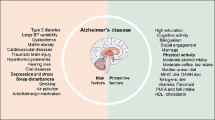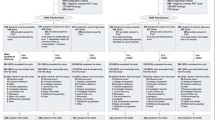Abstract
In this article, I explore how methods of investigation can allow us either to appreciate the intact cognitive and social abilities of people with Alzheimer’s disease or unwittingly obscure those same abilities. Specifically, I shall assert that (1) the biomedical- quantitative approach, while being generally appropriate for drug efficacy studies, does not allow us to appreciate the many significant strengths possessed by people diagnosed with dementia, (2) qualitative/narrative approaches do so admirably, and (3) understanding the cognitive and social strengths of people diagnosed is of paramount importance for developing optimal care giving approaches and reveals strikingly the shared humanity of those diagnosed with dementia and those deemed healthy.
Similar content being viewed by others
References
American Psychiatric Association. 2013. Diagnostic and statistical manual of mental disorders, 5th ed. Arlington, VA: American Psychiatric Publishing.
Beard R.L. 2004. In their voices: Identity preservation and experiences of Alzheimer’s disease. Journal of Aging Studies 18(4): 415–428.
----. 2016. Living with Alzheimer’s: Managing memory loss, identity, and illness. New York: NYU Press.
Corner, L., and J. Bond. 2006. The impact of the label of mild cognitive impairment on the individual’s sense of self. Philosophy, Psychiatry, & Psychology 13(1): 3–12.
de Medeiros, K., P.A. Saunders, P.J. Doyle, A. Mosby, and K.Van Haitsma. 2011. Friendships among people with dementia in long-term care. Dementia 11(3): 363–381.
Dewing, J. 2008. Personhood and dementia: Revisiting Tom Kitwood’s ideas. Internatonal Journal of Older People Nursing 3(1): 3–13.
Goffman, E. 1968. Stigma: Notes on the management of spoiled identity. Harmondsworth: Penguin Books.
Green, D., and J. Swets. 1966. Signal detection theory and psychophysics. New York: Wiley.
Higgs, P., and C. Gilleard. 2016. Interrogating personhood and dementia. Aging and Mental Health 20(8): 773–780.
Keady, J., and J. Gilliard. 2002. Testing times. The experience of neuropsychological assessment for people with suspected Alzheimer’s disease. In The person with Alzheimer’s disease: Pathways to understanding the experience, edited by P.B. Harris, 3–28 Baltimore, MD: The Johns Hopkins University Press.
Keady, J., L-C. Hydén, A. Johnson, and C. Swarbrick (eds). 2018. Social research methods in dementia studies: Inclusion and innovation. London: Routledge.
Killick, J. 2016. Creativity and dementia. In Positive psychology approaches to dementia, edited by C. Clarke and E. Wolverson, 175–195. London: Jessica Kingsley Publishers.
Kitwood. T. 1997. Dementia reconsidered: The person comes first. Buckingham: Open University Press.
Kontos, P. 2004. Ethnographic reflections on selfhood, embodiment and Alzheimer’s disease. Ageing and Society 24(6): 829–849.
----. 2005. Embodied selfhood in Alzheimer’s disease: Rethinking person-centred care. Dementia 4(4): 553–570.
----. 2012. Rethinking sociability in long-term care: An embodied dimension of selfhood. Dementia 11(3): 329–346.
Lock, M. 2014. The Alzheimer’s conundrum: Entanglements of aging and dementia. Princeton: Princeton University Press.
Lokon, E., J.M. Kinney, and S.Kunkel. 2012. Building bridges across age and cognitive barriers through art: College students’ reflections on an intergenerational program with elders who have dementia. Journal of Intergenerational Relationships 10(4): 337–354.
Lyman, K. 1991. Bringing the social back in: A critique of biomedicine and dementia. Gerontologist 29(5): 597–605.
McCurdy, D.B. 1998. Personhood, spirituality, and hope in the care of human beings with dementia. Journal of Clinical Ethics 9(1): 81–91.
Niebuhr, H.R. 1963. The responsible self: An essay in Christian moral philosophy. NewYork: Harper and Row.
Sabat, S.R. 2001. The experience of Alzheimer’s disease: Life through a tangled veil. Oxford: Blackwell.
----. 2010. Pre-positioning, malignant positioning, and the disempowering loss of privileges endured by people with Alzheimer’s disease. In Words of conflict, words of war: How the language we use in political processes sparks fighting, edited by F.M. Moghaddam and R. Harré, 89–104. Santa Barbara, CA: Praeger.
Sabat, S.R., and R. Harré. 1994. The Alzheimer’s disease sufferer as a semiotic subject. Philosophy, Psychiatry, and Psychology 1(3): 145–160.
Shweder, R.A. and M. Sullivan. 1990. The semiotic subject of cultural psychology. In Handbook of Personality Theory and Research, edited by L. Pervin, 399–416. New York: Guilford.
Snyder, L. 2009. Speaking our minds: What it’s like to have Alzheimer’s. Baltimore, MD: Health Professions Press.
Swaffer, K. 2015. Dementia and prescribed disengagement. Dementia 14: 3–6.
Swets, J.A., W.P. Tanner, Jr., and T.G. Birdsall. 1961. Decision processes in perception. Psychological Review 68(5): 301–340.
Swinton, J. 2012. Dementia: Living in the memories of God. Grand Rapids, MI: Wm. B. Eerdmans Publishing Co.
World Health Organization. 2017. Key facts. December 12. http://www.who.int/mediacentre/factsheets/fs362/en/. Accessed December 23, 2018.
Author information
Authors and Affiliations
Corresponding author
Additional information
Publisher’s Note
Springer Nature remains neutral with regard to jurisdictional claims in published maps and institutional affiliations.
Rights and permissions
About this article
Cite this article
Sabat, S.R. Dementia Beyond Pathology: What People Diagnosed Can Teach Us About Our Shared Humanity. Bioethical Inquiry 16, 163–172 (2019). https://doi.org/10.1007/s11673-019-09899-0
Received:
Accepted:
Published:
Issue Date:
DOI: https://doi.org/10.1007/s11673-019-09899-0




